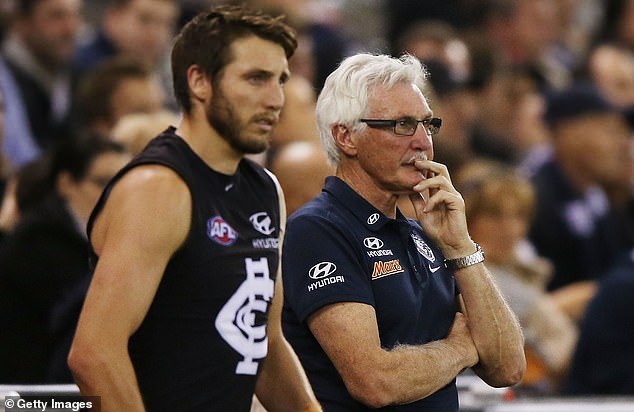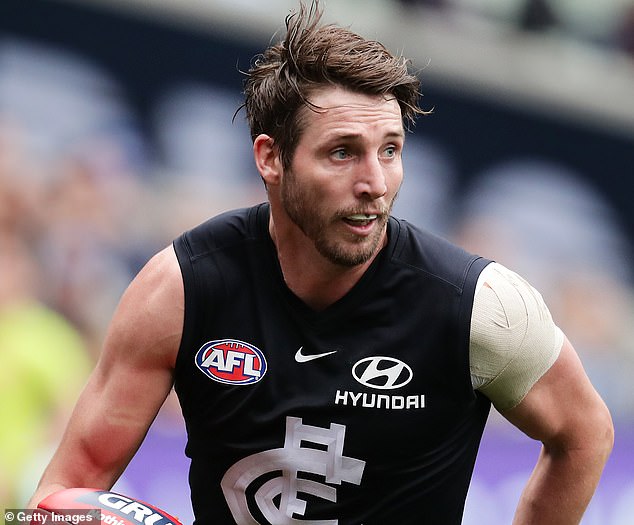- Dale Thomas had to seek counselling after missing a shot on goal
- The AFL star says the mistake haunted him for a long time afterwards
Football star Dale Thomas has revealed that it took him $400,000 in therapy and three years to recover from an embarrassing on-field incident.
The former Carlton star and Collingwood champion, who retired in 2019 after 258 AFL games, has spoken about a simple missed kick at goal in his seventh game for the Blues and the devastating impact it had on him.
“I had a shot (at goal) against Collingwood when I first played for Carlton, 35 metres out, I never had more confidence to go back and kick a ball, and I didn’t get the distance, I just missed it somehow,” Thomas explained on Triple M.
‘I estimate it took me three years and about $400,000 in AFLPA counselling to regain confidence in having a safe shot on goal.
‘I was a player who never had problems: I missed goals and I didn’t worry.
“But that kept me going around in my head and kept me up at night. It was the first time I was really shocked by something.
“If there had been a hole and a shovel, I would have kept digging. I wanted to get out of the field, it was disgusting.”
Thomas said the incident haunted him for a long time afterward.
Dale Thomas (pictured) had to seek advice after missing an easy shot on goal.

The football legend said the mistake haunted him for a long time afterwards.
“I think that was the first time I failed the ultimate test,” he said.
“I’ve had a lot of tough times throughout my career and you don’t always take advantage of them, but you prepared yourself in the way you could. And at that moment, I felt really ashamed.
‘It haunted me for a long time.
“You can’t escape it. It ended up being right in my head.”
In 2023, Thomas admitted that during the Covid pandemic he had to seek radical treatment to stop rapid weight gain in his post-retirement life.
The sudden halt to professional training and the enforced lethargy of Covid lockdowns saw Thomas gain 13kg, and his teammates let him know.
“Yes, I was glad to be the butt of some jokes, but that takes its toll on you in the end,” he told Channel Seven.
“No matter how hard I worked, I just didn’t seem to succeed.”
Thomas revealed he “really hated” football in the years leading up to his retirement when he appeared on I’m A Celebrity Get Me Out of Here in 2020.
The former Magpies and Blues star consulted medical specialists who recommended a “metabolic reset” involving a once-daily injection as part of a tailored weight loss programme.

Thomas said it took him three years and about $400,000 in counseling to regain the confidence he once had.
Your medication consists of a hormone that is already produced in the intestine and acts to slow down the rate at which the stomach empties, making you feel full for longer.
The injection also affects the brain’s reward center to combat food cravings and reduces the weight the body naturally tries to maintain.
Since making the dramatic change, Thomas has lost 10kg and is getting back to his original playing weight.
“Genetics plays a big role in weight loss, which I’ve never understood. When you play a professional sport for a long time, you just expect that if you gain weight, you train harder and you lose it,” he said.
‘It’s no surprise that if you gain 12-13 kilos, something needs to change, and for many of us during COVID, it was a case of eating our feelings – I was certainly doing that.
“The only time I’ve ever experienced weight gain was after playing a professional sport. Training so often over weeks and years, it was never a problem.
“What you considered out of shape or not at peak performance (when you were a professional athlete) back then to what it actually looks like now after your career is completely different.”


